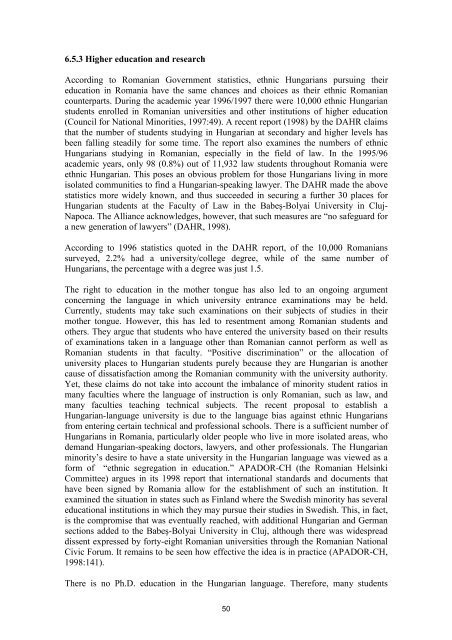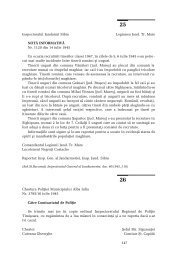Southeast Europe
Southeast Europe
Southeast Europe
Create successful ePaper yourself
Turn your PDF publications into a flip-book with our unique Google optimized e-Paper software.
6.5.3 Higher education and research<br />
According to Romanian Government statistics, ethnic Hungarians pursuing their<br />
education in Romania have the same chances and choices as their ethnic Romanian<br />
counterparts. During the academic year 1996/1997 there were 10,000 ethnic Hungarian<br />
students enrolled in Romanian universities and other institutions of higher education<br />
(Council for National Minorities, 1997:49). A recent report (1998) by the DAHR claims<br />
that the number of students studying in Hungarian at secondary and higher levels has<br />
been falling steadily for some time. The report also examines the numbers of ethnic<br />
Hungarians studying in Romanian, especially in the field of law. In the 1995/96<br />
academic years, only 98 (0.8%) out of 11,932 law students throughout Romania were<br />
ethnic Hungarian. This poses an obvious problem for those Hungarians living in more<br />
isolated communities to find a Hungarian-speaking lawyer. The DAHR made the above<br />
statistics more widely known, and thus succeeded in securing a further 30 places for<br />
Hungarian students at the Faculty of Law in the Babeş-Bolyai University in Cluj-<br />
Napoca. The Alliance acknowledges, however, that such measures are “no safeguard for<br />
a new generation of lawyers” (DAHR, 1998).<br />
According to 1996 statistics quoted in the DAHR report, of the 10,000 Romanians<br />
surveyed, 2.2% had a university/college degree, while of the same number of<br />
Hungarians, the percentage with a degree was just 1.5.<br />
The right to education in the mother tongue has also led to an ongoing argument<br />
concerning the language in which university entrance examinations may be held.<br />
Currently, students may take such examinations on their subjects of studies in their<br />
mother tongue. However, this has led to resentment among Romanian students and<br />
others. They argue that students who have entered the university based on their results<br />
of examinations taken in a language other than Romanian cannot perform as well as<br />
Romanian students in that faculty. “Positive discrimination” or the allocation of<br />
university places to Hungarian students purely because they are Hungarian is another<br />
cause of dissatisfaction among the Romanian community with the university authority.<br />
Yet, these claims do not take into account the imbalance of minority student ratios in<br />
many faculties where the language of instruction is only Romanian, such as law, and<br />
many faculties teaching technical subjects. The recent proposal to establish a<br />
Hungarian-language university is due to the language bias against ethnic Hungarians<br />
from entering certain technical and professional schools. There is a sufficient number of<br />
Hungarians in Romania, particularly older people who live in more isolated areas, who<br />
demand Hungarian-speaking doctors, lawyers, and other professionals. The Hungarian<br />
minority’s desire to have a state university in the Hungarian language was viewed as a<br />
form of “ethnic segregation in education.” APADOR-CH (the Romanian Helsinki<br />
Committee) argues in its 1998 report that international standards and documents that<br />
have been signed by Romania allow for the establishment of such an institution. It<br />
examined the situation in states such as Finland where the Swedish minority has several<br />
educational institutions in which they may pursue their studies in Swedish. This, in fact,<br />
is the compromise that was eventually reached, with additional Hungarian and German<br />
sections added to the Babeş-Bolyai University in Cluj, although there was widespread<br />
dissent expressed by forty-eight Romanian universities through the Romanian National<br />
Civic Forum. It remains to be seen how effective the idea is in practice (APADOR-CH,<br />
1998:141).<br />
There is no Ph.D. education in the Hungarian language. Therefore, many students<br />
50









